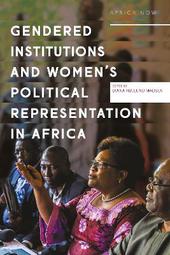
|
Gendered Institutions and Women's Political Representation in Africa
Hardback
Main Details
| Title |
Gendered Institutions and Women's Political Representation in Africa
|
| Authors and Contributors |
Edited by Diana Hojlund Madsen
|
| Series | Africa Now |
|---|
| Physical Properties |
| Format:Hardback | | Pages:272 | | Dimensions(mm): Height 234,Width 156 |
|
| ISBN/Barcode |
9781913441203
|
| Classifications | Dewey:324.082096 |
|---|
| Audience | | Tertiary Education (US: College) | |
|---|
| Illustrations |
4 b/w illustrations
|
|
Publishing Details |
| Publisher |
Bloomsbury Publishing PLC
|
| Imprint |
Zed Books Ltd
|
| Publication Date |
24 December 2020 |
| Publication Country |
United Kingdom
|
Description
During the course of the past three decades efforts of democratisation and institutional reforms have characterised the African continent, including demands for gender equality and women's political representation. As a result, some countries have introduced affirmative action measures, either in the aftermath of conflicts or as part of broader constitutional reforms, whereas others are falling behind this fast track to women's political representation. Utilising a range of case studies spanning both the success cases and the less successful cases from different regions, this work examines the uneven developments on the continent. By mapping, analysing and comparing women's political representation in different African contexts, this book sheds light on the formal and informal institutions and the interplay between these that are influencing women's political representation and can explain the development on women's political representation across the continent and present perspectives on an 'African feminist institutionalism'.
Author Biography
Diana Hojlund Madsen is a Senior Gender Researcher at the Nordic Africa Institute. She has worked and published extensively on gender and politics in an African context with a specific focus on Ghana. Her work on Ghana includes articles and book chapters and she holds a PhD on gender mainstreaming in Ghana from Roskilde University, Denmark.
ReviewsGender and representation scholars have been good at explaining why some African countries are among the top-ranked in the world when it comes to the high levels of women elected into elected offices. Are you interested in some in-depth insights into the mechanisms and dynamics of countries lagging behind their more well-known neighbors, this is the book for you to read. * Ragnhild Muriaas, Professor, University of Bergen * This book is an important and interesting contribution to the literature on women in politics in Africa. It provides a rare collection of rich case studies from eight African countries of how informal institutions in numerous ways work to exclude women from political spaces. * Vibeke Wang, Senior Researcher, Chr. Michelsen Institute *
|